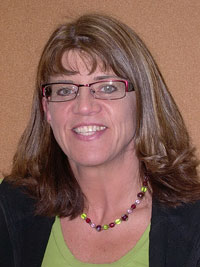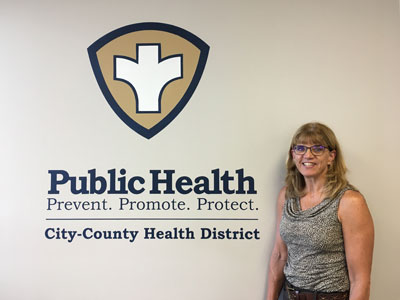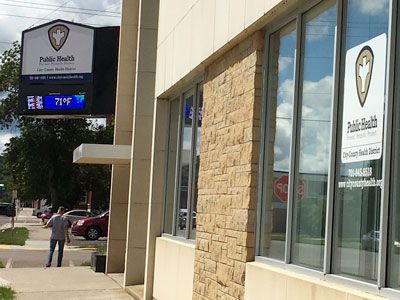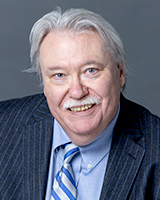Keeping the Public in Rural Public Health
By Brad Gibbens on

Rural health is successful when smart, committed people are involved. People with a strong understanding and appreciation for their community. People willing to take some risks. Theresa Will, director of City-County Health District (CCHD) in Valley City, North Dakota, represents that well.
Theresa has been involved in public health since 1989. She was raised in Elgin, North Dakota and her rural background serves her well. One does not have to come from a rural area to understand rural health, but it does help to understand rural culture. There is a culture to public health and a culture to rural North Dakota that seem to go hand in hand. Collaboration and cooperation, patience, and a willingness to take an appropriate risk are cultural norms for both public health and rural communities.
Theresa started her career in nursing at the hospital in Valley City before going into public health. She became the CCHD director in 2004. She credits her experience and love of working with elders in home care. She believes it prepared her for a more focused immersion into population and public health.
I didn't know what a 'health disparity' was at the time, but I knew that equity was important to me personally.
"The idea of assuring that everyone had access to basic services is and was very important to me," Theresa said. "I didn't know what a 'health disparity' was at the time, but I knew that equity was important to me personally."
Theresa describes public health as the "great convener" as it brings various community stakeholders together. Public health often lacks financial resources, so public health professionals have become adept at building partnerships. These joint ventures benefit the community and improve population health. There is also the advantage of familiarity and shared values in rural communities.
The partners that I need to work with on various community projects, programs, endeavors, are the same people that I go to church with, see at various meetings, and run into in the grocery store, making it much easier to maintain a personal connection.

"The partners that I need to work with on various community projects, programs, endeavors, are the same people that I go to church with, see at various meetings, and run into in the grocery store, making it much easier to maintain a personal connection," Theresa said. "Engaging stakeholders is usually not too difficult as they know me personally and know that we try not to ask for too much, too often. I believe that most of our partners understand the importance of public health, the role that we have in trying to assure that we develop and maintain safe and healthy communities."
Theresa concedes that change can be difficult in rural communities. The resistance or reluctance may be a preference to keep things the same or as they have been. She recognizes change may require resources that do not exist or would require a significant investment. She also believes there might even be concerns about confidence that it may not work in rural areas.
At times, it seems…like change happens more slowly in the rural areas.
"At times, it seems…like change happens more slowly in the rural areas," she said. "We need to see how it goes in more urban areas first and then we often hear 'but we aren't Fargo, we aren't Bismarck' so this doesn't really apply to us. We seem to be more insulated from things." CCHD has built a reputation for leading many community health efforts and being an active partner with many organizations and community-based programs.
Without local partnerships, we don't accomplish near as much.
"Without local partnerships, we don't accomplish near as much," Theresa said. "It took me a while to realize, and then promote the idea, that public health is much more than what can happen through our public health office, it involves everyone working together to do what's best for the community."
Concerns about health disparities and overall limited access found in rural North Dakota has driven much of the work that Theresa has targeted during her career. The Center for Rural Health has worked with her and her colleagues on a variety of projects and has seen the commitment to the public. Much of her innovative ideas have been within the family of population health.

CCHD is active with the Barnes on The Move Partnership (a 19 member collaboration working in the areas of nutrition, physical activity, and tobacco prevention). CCHD is working to address the high rate of alcohol use in the community with funding from the North Dakota Department of Human Services. CCHD also works with CHI Mercy Hospital on a community health needs assessment process. This process identified mental health as a community concern. The local partnership is working toward a community-based solution. All of these efforts focus on improving the community with better coordination and collaboration.
"I believe community is key in all of our public health work," Theresa said. "If we don't have community buy-in for the work that we do, we make very little progress, funding is compromised, and little changes."


 was the Deputy Director of the Center for Rural Health (CRH) at the University of North Dakota (UND) School of Medicine & Health Sciences and an assistant professor at the School of Medicine & Health Sciences in Grand Forks.
was the Deputy Director of the Center for Rural Health (CRH) at the University of North Dakota (UND) School of Medicine & Health Sciences and an assistant professor at the School of Medicine & Health Sciences in Grand Forks.



